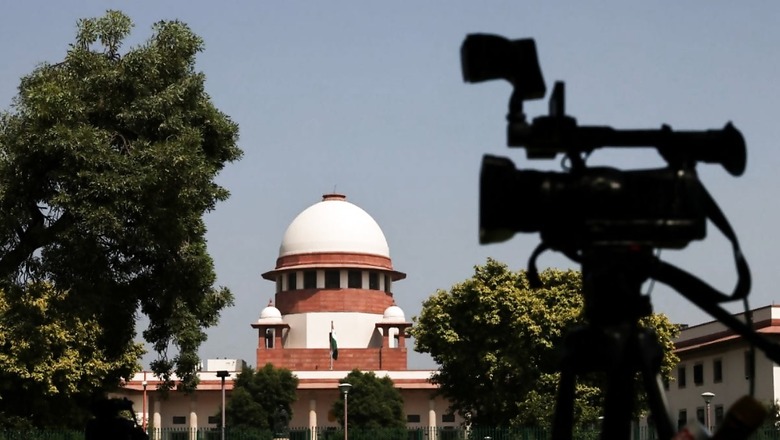
views
The Supreme Court on Thursday ruled the Competition Act, 2002 applies to public sector undertaking Coal India Limited (CIL), the company which answers the description of an enterprise engaged in mining and not discharging any sovereign function of the government.
The bench, which refrained from going into the merit of the case related to alleged abuse by the CIL of its dominant position, remanded a batch of cases filed mostly by coal companies and power producers back to the Competition Commission of India (CCI) for reconsideration.
The CCI had imposed a penalty of Rs 1773.05 crore on Coal India for imposing unfair/discriminatory conditions in Fuel Supply Agreements with power producers for supply of non-coking coal. The Competition Appellate Tribunal had, however, reduced the penalty to Rs 591 crore.
The CIL has approached the apex court against the order of the appellate tribunal.
A bench of Justices KM Joseph, BV Nagarathna and Ahsanuddin Amanullah said, “We would hold that there is no merit in the contention of the appellants (Coal India Ltd) that the (Competition) Act will not apply to the appellants for the reason that the appellants are governed by the Nationalisation Act and that Nationalisation Act cannot be reconciled with the (Competition) Act”.
“The transferred cases shall be sent back so that they may be dealt with on their own merits. The transferred cases are disposed of. Equally, the appeal shall be posted for being dealt with on its own merits. The interlocutory applications seeking interim relief in the pending appeal (by CIL) shall be listed in the second week of July, 2023,” the bench said in a 105-page verdict.
The bench said the content of common good is itself not a static concept and it may take its hue from the context and the times in which the matter falls for consideration by the court.
“If Parliament has intended that State monopolies, even if it be in the matter of distribution, must come under the ambit of the new economic regime, it cannot be found flawed by the Court on the ground that subjecting the State monopoly would detract from the common good, which the earlier Nationalisation Act, when it was enacted, undoubtedly, succeeded in subserving.
“We see no reason to hold that a State monopoly being run through the medium of a Government Company, even for attaining the goals in the Directive Principles, will go outside the purview of the Act,” the bench said.
It added the Competition Act aims at tabooing anti-competitive agreements and thereby promoting competition. It also prohibits abuse of dominant position, the court said.
“What is prohibited is, however, abuse of dominant position by an enterprise or a group. A group has been defined in the context of Section 5 which deals with regulation of combination. We find that the appellant (Coal India Limited) answers the description of an enterprise as defined”, it said.
The bench said it is noteworthy that the law giver has taken care to expressly include even departments of the government separately within the ambit of the word ‘enterprise’.
It added the definition of the word ‘enterprise’ is any activity relatable to the sovereign functions of the government which would include, all activities carried on by the departments of the central government, dealing with atomic energy, currency, defence and space.
The bench noted that in answer to a specific query as to whether the appellants are carrying on any sovereign functions. Senior advocate KK Venugopal and advocate Yaman Verma, appearing for CIL, have contended they are not carrying out any sovereign functions.
“This relieves the Court of undertaking a discussion, which, even otherwise, may be unnecessary, having regard to the nature of the function. The first appellant (CIL) is not a Department of the Government. It is a Government Company. In fact, what is excluded from the definition of the expression ‘enterprise’ is a government department carrying on government functions.
“Carrying on business in mining, cannot, by any stretch of imagination, be described as a sovereign function. There is nothing in the definition which excludes a State monopoly which is even set up to achieve the goals in Article 39(b) of the Constitution”, the bench said.
Article 39(b) says the ownership and control of the material resources of the community are so distributed as best to subserve the common good.
Senior advocate KK Venugopal had submitted the coal mines operated by the appellants (CIL) pursuant to the provisions of the Coal Mines (Nationalisation) Act, 1973 would be wholly outside the purview of the Competition Act.
He said the very purpose and policy underlying the Nationalisation Act was to monopolise the operation of the coal mines and coal mining in the hands of the central government and its agencies and it is not an ordinary monopoly.
“It is a monopoly created by the Nationalisation Act. Having regard to the need to immunise it from challenge, it was accorded protection of Article 31B of the Constitution of India. it has been inserted in the Ninth Schedule to the Constitution,” he had submitted.
The first constitutional amendment Act added Article 31-B to the Constitution which says-None of the acts placed in the 9th Schedule shall become void on the ground that they violate rights under Part III and no judicial review is possible.


















Comments
0 comment